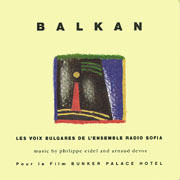
Balkan
1989: Virgin 2-91368
Les Voix Bulgares de l’Ensemble Radio Sofia
music by Philippe Eidel and Arnaud Devos
pour le film Bunker Palace Hotel
Not only have I never seen this film, I’ve never even found reference to a legitimate copy of it being viewable. The soundtrack is nearly as scarce and mysterious—since I scored a copy quite by happenstance in the early 1990s, I’ve managed to get my hands on only one other, which I gave to a friend who had freaked out when she discovered I had my own copy: “Oh my god!!!” she yelped, “I used to have a cassette of this and would lie on the floor in a dark room with my head between the speakers while it played, it’s INCREDIBLE!! Where did you FIND this?!”
Well, wherever I found it, they only had the one copy I bought, and the place I found the copy I bought for her only had one as well.
It’s a remarkable soundtrack, whatever the film’s like…a dramatic soundscape for the sound of Le Mystère des Voix Bulgares to illuminate and flesh out. It’s deliciously dark, at times cloak-and-dagger-ish (especially on the dainty “Balkan Hotel,” which is like a cross between the opening credits of “Murder By Death” and the PBS series “Mystery!”), but beyond all of the shady posturing there’s the relevant-yet-possibly-anachronistic voice of those womens’ choirs, stamping the scene with regional and temporal context while leaving a lot open to speculative imagination.
On top of all of that, there are lovely nuances in the mix that have startlingly immdeiate effect: the 24-second-long track “Nikolai” is probably the most extreme example of this, but “Zabranena Pesen” is a more comprehensive voyage through the sonic realms of this album. When you’re nearly worn out from listening to all this range of extremes and all that Bulgarian-womens’-singing, there’s the dramatic darkness of “Gospodi Polmiluj” to experience: you are transported into an intense candlelit religious ceremony which begins with whispered prayers all around you atop an uneven humming drone which could either represent uneasy meditation or herald violent change. The voices fuse those elements into the form of strident grieving, as far as I can tell, and when the track returns to its drone/prayer base there’s no guarantee that an explosion isn’t just around the corner.
Comments © 2005 Mark Ellis Walker, except as noted, and no claim is made to the images and quoted lyrics.